Welcome to your ultimate guide for immersing yourself in the Christmas traditions of Greece! I’ve compiled essential information to help you discover where to visit, what to witness, and, most importantly, what culinary delights to relish during your Christmas in Greece
Greek Christmas Traditions
Here’s a preview of what my guide covers:
- In Greece, the role of the gift-giving figure is Saint Basil (Aghios Vasilis), distinct from Saint Nicholas
- Christmas presents are typically exchanged on New Year’s Day rather than on Christmas itself
- Experience a unique blend of holiday symbols in Greece, including decorated boats and a huge Christmas tree
- Dive into the world of Greek Christmas carols known as Kalanda, featuring distinct melodies and lyrics rooted in Christian stories
- Join the Epiphany celebration on January 6th, a commemoration of the baptism of Christ.
- Witness the awe-inspiring Great Sanctification of Water ceremony on the Epiphany, involving the blessing of bodies of water and the exciting cross-retrieval diving tradition.
- Delight in the flavors of traditional Greek Christmas cuisine, including succulent pork, stuffed turkey, mulled wine, raki infused with honey, and mouthwatering Christmas cookies known as kourabiedes and melomakarona

Get ready for an unforgettable Greek Christmas experience with this comprehensive guide!
Deciding to travel to Greece for Christmas is not the usual way to spend the holidays, yet if you want to spend Christmas in Greece, you’ll want to know what to expect.
With the arrival of the merry season, there are endless options for entertainment and family moments in Greece at Christmas. Every city celebrates Greek Christmas, each offering music concerts, outdoor festivals, and Christmas markets. In fact, a Greek Christmas vacation is one of the most magical ways to spend the holiday!
In this article, you will learn everything about the most important Greek Christmas traditions. We will show you where it is better to spend the holidays in Greece and what food the locals usually prepare and eat during this Christmas period.
So, let’s dive into the festive traditions, holiday destinations, and delectable Greek Christmas cuisine that will make your holiday truly special.
Skip Ahead To My Advice Here!
Christmas Traditions In Greece
Better known for being a unique summer destination, it may have never occurred to you that Greece is also a great place to visit in winter (hello, mild winter days!), especially during Christmas.
Somewhere at the crossroads between the easternmost Balkan culture and the influence of Western European countries, Greece has managed to keep some very characteristic traditions that give life to a very unique Greek Christmas experience.
Agios Vasilis – Greek Santa
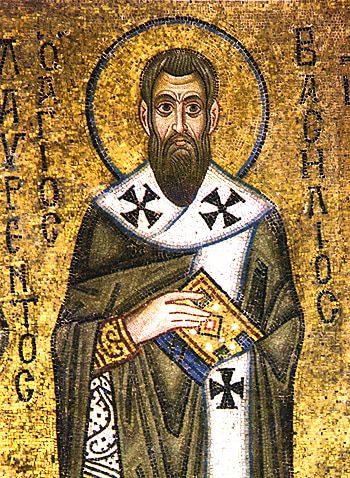
Well, yes, Greece has its own “Greek Santa.” And although it can share some of the looks of the better-known Santa Claus that most kids wait for all over Europe, Agios Vasilis is a little different.
Deeply related to the Eastern Orthodox tradition, it is not Saint Nicholas the saint giving away gifts during the Christmas season but a different saint, Basil the Great, who is, in the local tradition, translated as Agios Vasilis, which stands for Saint Basil, the patron saint of sailors.
The Saint Basil of Caesarea was a contemporary of the legendary Saint Nicholas, probably living during the same century. In the Greek tradition, he brings gifts to children every January 1st since that is St Basil’s Day.
From this comes the fact that still, in many households all over Greece, many kids do not get their presents on Christmas Day in Greece, but they will open them on New Year’s Day; however, more modern Greek families have made a date shift to December 25th.
As a result, many kids have started getting their presents on Christmas, others on January 1st, and many more on both days!
This brings us to the next seasonal tradition… Vasilopita, but you will read more about it when we get to Christmas foods!
Traditional Christmas Dinners And Family Reunions
As per the strict Greek traditions, deeply connected with its Orthodox religion, Christmas is a day for a family reunion. Long hours spent baking, stuffing, and mixing in the kitchen are followed by big family dinners, where every family member finds a place to eat, celebrate, and rejoice.
During Christmas, tickets are often sold out since it is common for people to travel from one corner of the country to another to spend the holidays with friends and family.
As we mentioned above, it was not really the moment to exchange gifts; however, this has changed over the last few years, and other than tons of food, there are also tons of presents, especially for children.
To Karavaki – Christmas Decorations
You may be wondering, how does Greece decorate for Christmas?
If you happen to spend some time in Greece during Christmas, you will be surprised to see small boats decorated with lights in almost every square of the country. It is called the Karavaki, and it is a Christmas… boat!
As a matter of fact, decorations for Christmas in Greece only recently included Christmas trees (in the last few decades). Now, every year, there is the most famous Christmas tree of all in the center of the important Sintagma Square in Athens. However, this is a relatively new tradition.
For centuries, the Greeks have decorated a boat. To Karavaki (literally, the small boat) is a renowned Christmas symbol, only logical in a country with so many islands, you would say… well, it is still a very much heartfelt tradition on many Greek islands, where — in many homes — the boat is decorated and placed by the window as a sign of good omen for the many sailors and fishermen at sea to return home safe from their journeys for the celebration.
The small Christmas boat also recalls that Saint Nicholas still plays a part during the merry festive season. The decoration of the Christmas board is on December 6th, St. Nicholas Day, who happens to be the protector saint of seamen.
Agios Nikolaos (Saint Nicholas) is a very important saint for the Greek Church; thus, Christmas celebrations on that day take place all over the country. In a way, December 6th kicks off a whole month of lights, Christmas sweets (too many of them!), presents, carols, and Christmas spirit.
Kalanda – Greek Christmas Carols
Another unique tradition that Greek kids adore is singing traditional Christmas carols from door to door. Locally known as Kalanda, these classic Christmas songs can still be heard in every neighborhood during the Greek Christmas holidays.
Groups of children gather pretty early in the morning, many of them carrying a triangle, and go from house to house singing carols at each door where they stop. Once the house owner opens the door, the kids ask, “Na ta poume?” (literally, shall we say it? But meaning, shall we sing it?).
Right after, kids will start sounding their high-pitched triangles to accompany the song. Kalanda often tells us about traditional facts and legends related to the birth of Christ, or that took place around that period.
Typically, kids are generously rewarded with money and sweets, so much so that kalanda money is often divided among the kids who return home with considerable loot!
This tradition takes place in Greece on Christmas (both Eve and Day), as well as on New Year’s (Eve & Day), and January 6th, Epiphany, and the last official day of celebrations.
The Kallikantzaroi
Another treasured Christmas legend concerns the only thing to be afraid of during Christmas: the Kallikantzaroi, a kind of magical evil spirit.
Often found in the traditions of other countries as well, in Greece, the Kallikantzaroi is typically a creature that comes out at night. It has a human-like aspect but walks with a weird posture and very long and thin limbs.
According to the legend, these demons have only one task: to slowly saw down the primal trunk of the tree of life, a trunk that plays the crucial role of preventing the Earth from falling into the Underworld.
Much of the job is considered to be completed with the arrival of the winter solstice, so these creatures, fearing that the world will collapse upon them, sneak their way into the world of the living, where they stay and play tricks for a fortnight, spreading terror and mischief from December 25th to Epiphany.
In fact, it is said that on the day of Epiphany, after the blessing of the waters, the Kallikantzaroi make their way back to the underground, where they find that the tree of life has regenerated, so they get back to their job until the following holiday season.
How do you protect yourself from the Kallikantzaroi?
They say it is relatively easy to trick these creatures as they are not as intelligent as you might think. A very famous way to protect against them is to place a colander on the doorstep.
According to popular legends, the kallikantzaroi will spend too much time counting the hols. Still, since they cannot count over the number two, they will eventually get distracted and forget about playing a trick in your home!
Epiphany
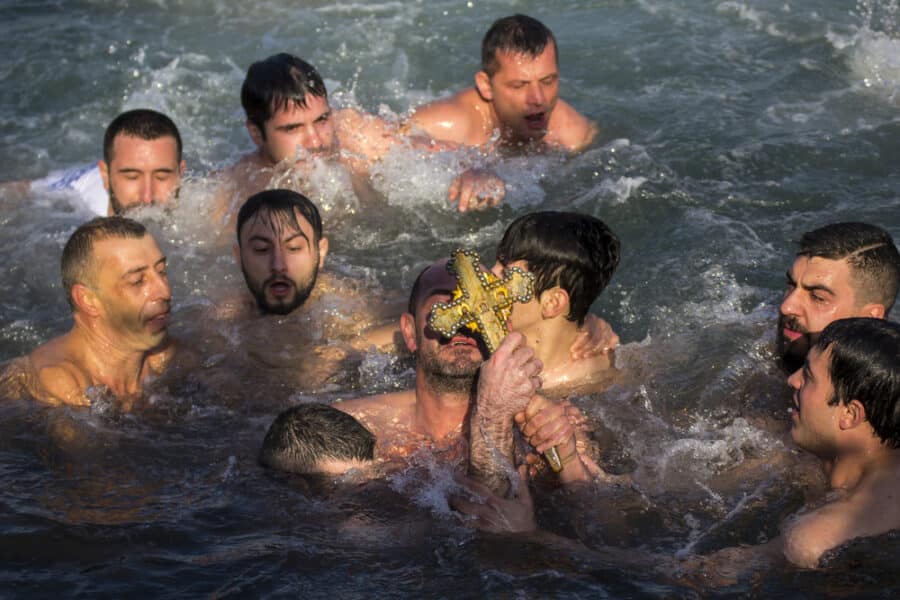
Closing the Christmas season and almost a month of celebrations, January 6th is an important day in the Orthodox tradition. And as such, it must start very early!
On this day, locals commemorate the baptism of Christ, and it is considered such an important day that it is also a bank holiday. Also known as Theophany or Ta Fota (The Lights), the Greek Orthodox Church celebrated the presence of God in the baptism of Christ.
Early in the morning, the solemn Great Sanctification of Water occurs across the country, usually by the sea and beside rivers and lakes. After an important church service, a priest walks together with hundreds of people towards the water’s edge.
Once there, he blesses the waters by casting a cross into it, and right after, young men (and women) dive into the holy water to retrieve it.
And yes, despite being in Greece, winter waters are indeed cold! So, the lucky one who makes it through the cold water finds the cross first, returns it to the priest, and receives a special blessing to last through the rest of the year.
Brands We Use And Trust
A Christmas Feast: Greek Christmas Food
Food in Greece is a serious affair, and during a Greek Christmas, even more! There are dozens of typical dishes prepared and eaten only during this period.
Although Christmas food is not the same across the country, some dishes will be present at every Christmas table all over Greece, so take a look; these are some of the foods that most people love.
Greek Christmas Bread – Christopsomo
Known as Christopsomo (or Christ bread), this delicious round loaf is a traditional Ottoman kind of bread that cannot be missed from any Greek table. It is typically decorated with a cross made of dough in the center and often has almonds or nuts on top, a symbol of prosperity. This bread is often savored during Christmas Eve dinner.
Greek Christmas Treats & Sweets

Loved by everyone, melomakarona (honey cookies) and kourabiedes (kind of shortbread cookies) are the most famous traditional Christmas sweets you can find in Greece.
These traditional sweets are made with ingredients that are a staple in the local cuisine, including olive oil, honey, and nuts.
Christmas Dinner In Greece
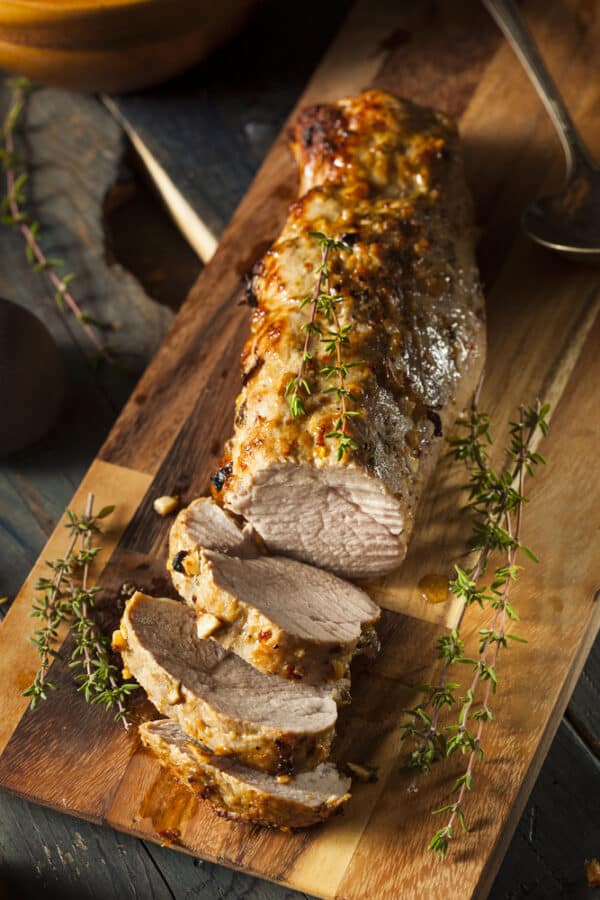
Arguably the most common meat served during the holiday, pork is often the first meat to break the fast that has been going on during Advent.
Another typical dish is stuffed turkey, not really Greek, but a tradition imported from the rest of Europe in recent years.
Vasilopita
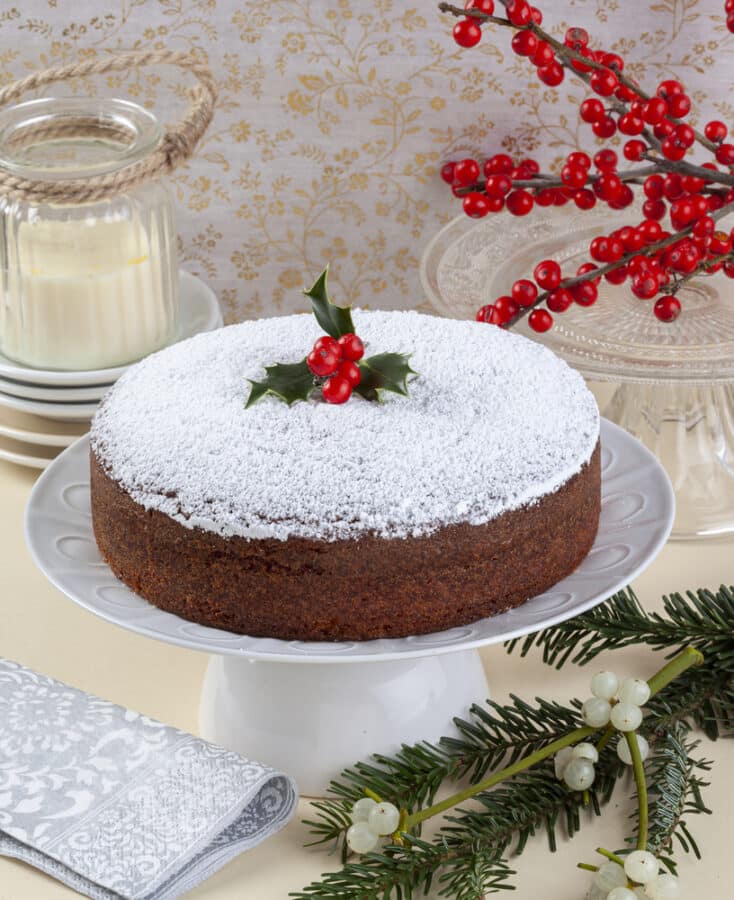
Connected with Agios Vasilis and New Year’s Day, this sweet cake hides a coin or lucky charm in the dough, which is supposed to bring good luck to the one who finds it in its slice.
Things To Do At Christmas In Greece
So once you’ve discovered the traditions and eaten all the delicious Christmas food, it is time to decide what things you can do in Greece during the merry holidays; here are some ideas.
Christmas Markets In Greece
Although the tradition comes from central Europe, always more cities in Greece have started seeing Christmas Parks or Christmas Markets where it is possible to buy Greek Christmas decorations for your tree (or boat!), Christmas sweets, and taste a glass of mulled wine or raki with honey!
One of the best Christmas Parks in Europe, the Christmas Factory, is held in Athens. Here, you will find a huge Christmas market, where there are games and entertainment for kids and the whole family.
Athens During Christmas
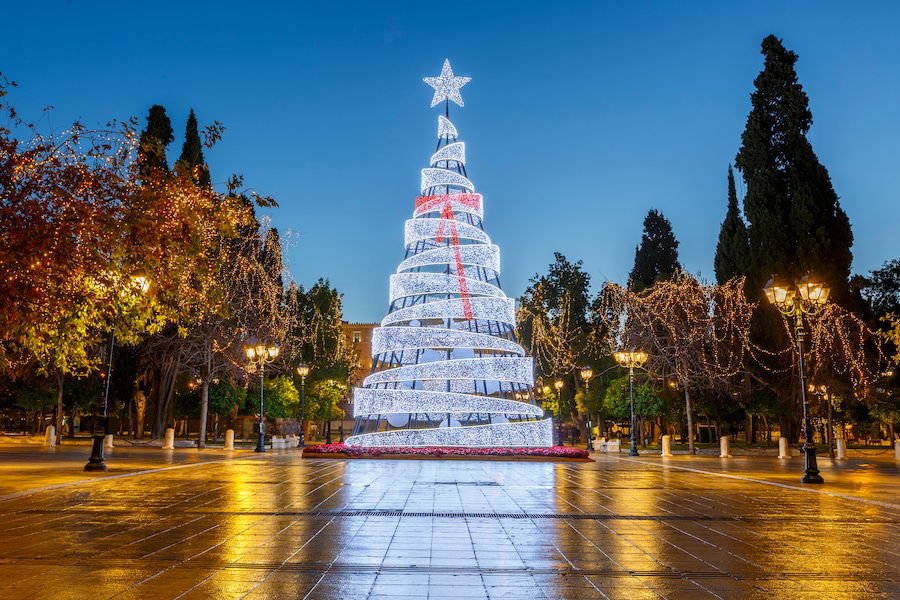
A popular Greek destination all year round, Athens is an even more popular place to visit during the holidays. Traditional districts, such as Plaka and the small Anafiotika, turn into magical settings when decorated with hundreds of Christmas lights.
But that is not the only reason to visit Athens at Christmas. Doing your Christmas shopping in Athens can prove a genuine bargain!
Many stores and retailers decide to cut their prices during Christmas, so getting your presents in the Greek capital can be an excellent idea! It’s also a great place to pick up Greek Christmas decorations.
Besides, many local landmarks, including archaeological sites, museums, and exhibitions, also offer a reduced rate for visitors in winter. With most people busy thinking about what to cook for Christmas dinner, it will be easy to find such popular places empty.
Please take advantage of the season to visit the Acropolis; it could be the best Christmas gift you might ever make to yourself!
Travel To Napflio
Why not celebrate Christmas by traveling to those towns and villages where celebrations are unique? Napflio is definitely one of them!
Less than three hours from Athens, it is easy to access Napflio by car. The already picturesque city becomes an enchanting Christmas village during the holidays.
Once in town, head to the local Syntagma Square, which hosts an impressive Christmas tree like Athens’ Syntagma Square.
Explore Arachova
Arachova is a magic winter destination that most people don’t even know about, and it can represent the perfect Christmas getaway for a different holiday in Greece!
Arachova celebrates Christmas with lights, idyllic landscapes, and the extra glam of winter sports.
Move This Adventure To Your Inbox & Get An Instant Freebie

No spam. Unsubscribe at any time.
How To Say Merry Christmas In Greek
To say “Merry Christmas” in Greek, you say “Καλά Χριστούγεννα” (Kala Christougenna). Pronunciation-wise, it’s broken down as follows:
Kala is pronounced as kah-LAH.
Christougenna is pronounced as kree-stoo-YEN-nah.
So, when you wish someone “Merry Christmas” in Greek, you’d say it as “kah-LAH kree-stoo-YEN-nah.”
Greece During Christmas FAQs
What is the significance of Christmas in Greece?
Christmas is an important holiday in Greece and is celebrated for a 12-day period From Christmas until Epiphany on January 6th. It holds religious and cultural significance for Greeks, and it is a time for family gatherings and festivities.
What are some common Greek Christmas traditions?
Some common Greek Christmas traditions include decorating Christmas trees, singing carols (known as “kalanda”), and exchanging gifts. Saint Basil is the gift-bringer in Greece, and gifts are often exchanged on New Year’s Eve.
What are traditional Christmas foods in Greece?
Traditional Greek Christmas foods include melomakarona (Christmas biscuits soaked in honey syrup and sprinkled with walnuts or sesame seeds), kourabiedes (crumbly butter cookies covered in powdered sugar), and vasilópita (a sweet bread or cake with a hidden coin inside, served on New Year’s Day).
Do Greeks decorate Christmas trees like in other countries?
Yes, many Greeks decorate Christmas trees as part of their Christmas traditions. However, in some regions of Greece, it is still common to decorate a traditional Christmas boat instead of a tree, reflecting the importance of maritime traditions in those areas.
Do Greeks fast or observe any religious customs for Christmas?
In Greece, Christmas is preceded by a period of fasting called “Advent” or “Christmas Lent.” During this time, some people abstain from certain foods or practices as a spiritual preparation for Christmas. The fasting period ends with a festive meal on Christmas Eve.
What is the Christmas weather like in Greece?
The weather during Christmas in Greece varies depending on the region. In Athens and other southern parts of the country, it is generally mild, but in northern regions, it can be colder with the possibility of snow. Mountainous areas are more likely to have snowy conditions during this time.
Are there any recommended Christmas destinations in Greece?
Yes, there are several recommended Christmas destinations in Greece. Some popular choices include Athens, Thessaloniki, Arachova (known for its festive atmosphere and nearby ski resorts), the Meteora monasteries (offering a unique spiritual and scenic experience), Trikala-Elati-Pertouli (mountainous regions known for their natural beauty), Ioannina-Metsovo (offering a mix of culture, nature, and traditional Christmas festivities), and Kaimaktsalan-Agios Athanasios (ski resorts with stunning mountain landscapes).
While Greece may not be a popular Christmas destination, as you can see, it should be. So, tell us, when will you next be in Greece for Christmas? Merry Christmas from us to you and yours.


Thank you for sharing the post, it’s very informative. Christmas is a beautiful festival and its so much to do at Christmas. The food is very delicious and the EPIPHANY tradition is something very new for me.
Hello Gabi. I was thinking about a trip to Greece this Christmas/New Years with my adult daughter, but I wasn’t sure if we’d be stranded with nothing to do while everyone celebrates with their families. I noticed that there don’t seem to be any group hiking trips offered around that time. Is that because of the holidays or the weather?